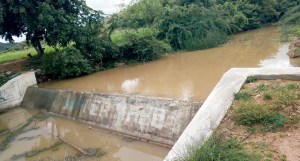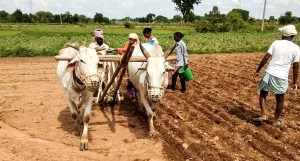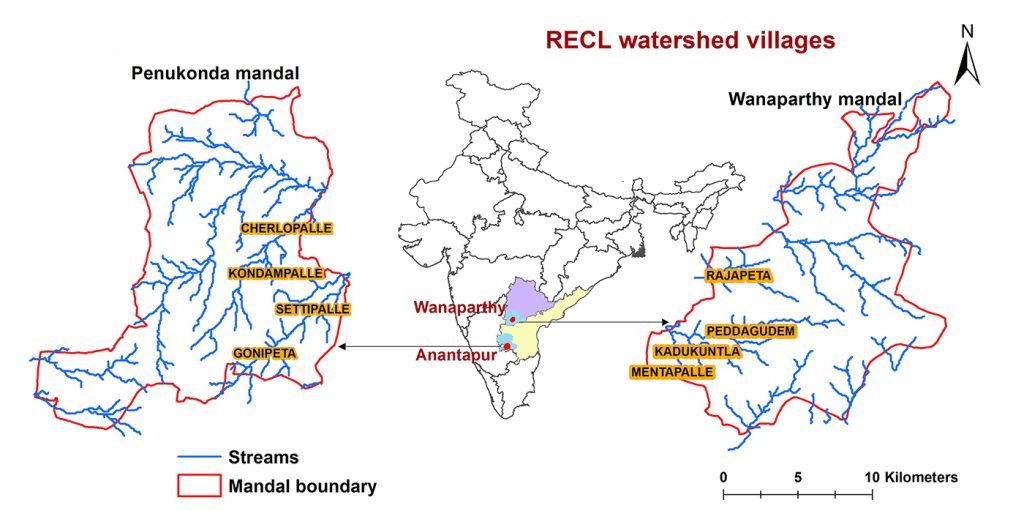
(L) Groundnut demonstration plot interspersed with guava trees in Anantapur. (R) Pigeonpea demonstration plot in Wanaparthy. Photo: ICRISAT
This cropping season, observing all safety measures amidst the COVID pandemic (see box), more than a 1,000 farmers will be participating in demonstrations on growing improved groundnut, pigeonpea and vegetables with balanced application of fertilizers and planting orchards at two learning sites of a successful watershed initiative in southern India. Simultaneously, more than 300 farmers will be participating in constructing new farm ponds. Increased water availability due to watershed interventions has enabled farmers in two states to grow new and better crops and increase production on drought-stricken lands that barely supported subsistence.
Entering into Phase II this year, this Corporate Social Responsibility project of the Rural Electrification Corporation Limited (RECL), India, seeks to build on work that began in 2014 in Wanaparthy district in Telangana state and Anantapur district in Andhra Pradesh state.
The watersheds are now developing into exemplar sites to provide a proof of concept of scaling-out key on-farm solutions for climate-resilience and strengthening of livelihoods and mainstreaming of women farmers.These projects will show the way forward not only for uplifting drylands but also for leveraging social responsibility in uplifting the underprivileged, while contributing to food security and ecosystem services.
During Phase II, the initiative will focus on the following:
- Intensify on-farm water solutions for drought-proofing,
- Extensive on-farm mechanization
- Infrastructure for improving operational & economic efficiency,
- Mainstreaming of women farmers through select activities
- Building on rejuvenated soil and water resources for on-farm intensification and diversification
Impact of Phase I of the watershed projects:

Check dam at Anantapur. Photo: ICRISAT
Harvesting rainwater
Net water storage capacity of more than 50000 m3 created at each site.
Major water conservation measures implemented at Anantapur site includes 58 farm ponds, 15 check dams, 256 rock-filled-dams/loose-boulder-structures, 43 open-well/borewell recharging pits and seven sunken/mini-percolation pits.
In Wanaparthy, major water conservation structures included 137 farm ponds, 20 check-dams/check-walls, 134 rock-filled-dams/loose-boulder-structures, 77 open-well/borewell recharging pits, 20 sunken/mini-percolation pits, 37 nala plugs and other structures.
Managing soil:

Sowing demonstration at Wanaparthy. Photo: ICRISAT
Farmers saved on average Rs 2,500 per ha on chemical fertilizer application annually with the added advantage of improved soil health. Recycling of hardy on-farm wastes through chopping with shredders and aerobic composting technology for soil-carbon building were promoted in 150 farms annually.
Soil health mapping helped estimate fertilizer requirement as the intervention sites showed widespread soil fertility degradation. In both sites, the soil was treated with the required dosage of macro/micro nutrients and soil-carbon building practices were promoted in the villages after the mapping activity.
- The safety of line-staff and farmers is a priority while implementing critical farm interventions
- Line-staff are equipped with masks and sanitizers and have been oriented on social distancing guidelines
- Regular site inspections have minimized but farm inputs for intensification and diversification are being distributed following all safety guidelines
- Gatherings and meetings have been put on hold
- Communication with farmers is mostly through phone or one-to-one when needed.
The outcomes of these interventions were as follows:
- Yield benefits of 10-90% were reported in 600 farmers’ fields at each site after the use of need-based fertilizer and improved crop varieties like groundnut, pigeonpea and paddy.
- With rejuvenated water and soil resources in the watershed, the systems intensified and diversified. Around 40 new farmers in Anantapur and Wanaparthy started vegetable cultivation with mechanized easy planters that facilitated transplanting and reduced overall drudgery.
- More than 80 households in Anantapur and 30 in Wanaparthy planted orchards in 1-2 hectares each. Five-six fruit saplings of mango, guava, amla (Indian gooseberry) and jamun (Indian blackberry) were distributed and around 500 households in Anantapur took up home gardening. Kitchen gardens were promoted through women farmers – around 200 household in Anantapur and 100 households in Wanaparthy were given kitchen garden kits.
- Income generation programs for women increased their incomes and resilience. Through Self-Help Groups, 226 women in Anantapur and 89 in Wanaparthy bought sheep, goat, buffaloes and earned incomes of Rs 4,000-5,000 annually. Around 120 families in Anantapur and 350 families in Wanaparthy took to raising poultry, around 20-30 chicks, in their backyards and around 90 women engaged in non-farm activities received support.
- As part of the effort to develop the watersheds as sites of learning, in this current cropping season, more than 1,000 farmers will benefit from demonstrations based on previous learnings and build on the impacts mentioned above.
Project location and demographics

In Anantapur district in Andhra Pradesh, the project covers 6,810 hectares in four villages (Kondampalle, Gonipeta, Settipalle and Cherlopalle) of which 3,150 hectares are under cultivation. The watershed is home to 8,700 people in 1,480 households.
In Wanaparthy district of Telangana, the project was implemented in 5,400 hectares covering four villages, (Rajapet, Kadukuntla, Peddagudem and Mentapalle) of which 3,970 hectares is under cultivation. The watershed is home to 11,726 people in 2,285 households.
Reference for impacts: http://oar.icrisat.org/10952/
Read more Exploreit
Funder: Rural Electrification Corporation Limited, New Delhi, India
Partners: NGOs (Samatha Society for Rural Education and Development, Anantapur; BAIF Institute for Sustainable Livelihoods and Development (BISLD), Hyderabad), Department of Agriculture, Andhra Pradesh and ICRISAT


